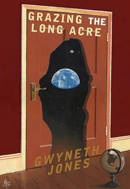

P.S. Publishing, hardcover, 9781906301552
Gwyneth Jones has been writing amazingly good science fiction and fantasy, from a feminist viewpoint, for several decades now. Best known for her novels, this Englishwoman's virtues are evident again in the fourteen stories in this, her third collection.
The stories share the novels' clear, chill view of human weakness, particularly of sexist oppression—a take reminiscent of stories by the late, and better‒known, Alice B. Sheldon. Avoiding easy resolutions, challenging the reader, Jones' storytelling is subtle, indirect, dense. Crucial details can slip by in an aside for the reader to spot later, or never. Her characters are usually displaced from everyday life by travel, duty, or calamity as they move through our world, imagined futures, or to distant planets. Several examples show her range.
"The Eastern Succession" looks ahead to a far future, and a world ruled nominally by women — although really by thugs who serve Rulers living unseen in domes rising from the sea. A dynasty having failed to produce an heir, a new line must be selected. The choice is supposed to be free, but is not. It is observed, imperfectly, by a man whose gender excludes him from the discussions, and whose history excludes him from the respect of his culture. The setting is based on Jones' years living in Malaysia, intriguingly transformed into a world only superficially similar to today's Asia. For example, the story's "boys" are not what we first think they are.
Although written in 1992, "Blue Clay Blues" feels very current. Journalist Johnny pursues a lead in a town two hundred miles from New York City ‒ which, in this near‒future setting, is in the dangerous "boondocks" of the USA. Missed signals on childcare land Johnny's toddler daughter, Bella, in the car with him; a choice he regrets when they are picked up by a group of local men whose menace is neatly shown by their question, not pressed at first, as to whether he can prove she's his child. The humanity of the townspeople is captured well, although they might almost be a different species from the sleek city journalist ‒ their children undernourished next to Bella, their physical surroundings meaner than in the city, illiterate, but with a weapon on every man's hip. Jones' sharp take on sexual matters shows Johnny both facing increased danger as he must discreetly stop Bella from a moment of childish self‒exploration, and, later, finding an ally among people who have "forgotten anything they ever knew about sexual equality."
"Grazing the Long Acre" gives us a great metaphor for survival in bleak conditions, as a young woman who has made bad choices tries to avoid making still worse ones.
"La Cenerentola" speculates on possibilities for high‒tech childbearing. A vacationing lesbian couple, parents of a daughter grown solely from their genes via a "fused-egg" procedure, meet a family with children having a far stranger makeup.
Some of these stories share characters and setting with some of Jones' novels
‒ the award-winning White Queen, Divine Endurance, and Life.
Grazing the Long Acre can be enjoyed without having read the novels, but
the reader will want to move on to the novels anyway after this selection of
stories by Gwyneth Jones — a writer who deserves to be much better known.